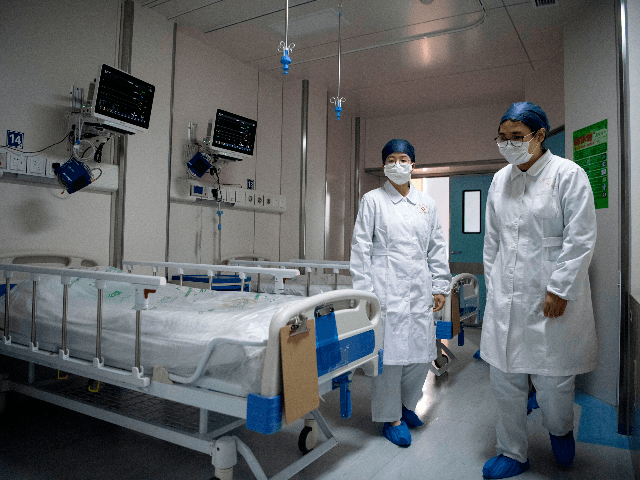The Chinese government is desperately trying to get some positive spin out of the coronavirus epidemic by ostentatiously saluting the medical personnel fighting (and in some cases dying) on the front lines of the epidemic.
Part of that propaganda campaign appears to have backfired badly as Chinese social media users responded with anger to the much-touted story of a pregnant nurse who insisted on staying at her post in a hospital overflowing with coronavirus patients.
The South China Morning Post (SCMP) reported on Friday that nurse Zhao Yu was only about 20 days away from giving birth when Chinese state media decided to spotlight her as a selfless hero for ignoring the pleas of her concerned colleagues and continuing to treat coronavirus patients at a hospital in Wuhan, ground zero of the outbreak.
Zhao’s story was not received by the Chinese public in the spirit the Communist Party was hoping for:
After many social media users raised concern about a heavily pregnant nurse working in a highly contagious and difficult environment, the video clip was withdrawn from [state broadcaster] CCTV’s website.
“I’m not touched at all – on the contrary, I’m angry,” read one of many similar comments on Weibo, China’s Twitter. “Shouldn’t a woman who’s nine months’ pregnant be at home? She’s in such thick protective clothes and it’s hard for her to even move around. Can that be good for her baby?”
Another nurse in Wuhan named Huang Shan came back to work early from sick leave after a miscarriage and was assigned to the incredibly dangerous coronavirus isolation ward, an assignment she concealed from her family because she did not want them to worry about her. Huang’s story prompted much the same response as Zhao’s:
Hou Hongbin, a feminist writer in Guangzhou, said the reports were disrespectful and it was “inhumane” to let the two nurses keep working.
“Hospitals should not be allowing a nurse who is nine months’ pregnant – or the one who’d had a miscarriage – work. Their immune systems are weakened, and it’s highly possible that they will be infected with the virus themselves,” Hou said.
Her views were echoed by Huang Lin, a feminist researcher and professor at Capital Normal University in Beijing, who called the reports inappropriate.
“Even during an epidemic, medical staff need to protect themselves first,” she said.
Evidently, many Chinese are interpreting these stories as signs of the Communist Party’s cruelty, incompetence, and desperation rather than inspirational tales of heroism and devotion to duty. Another propaganda backfire mentioned by the SCMP was a widely circulated video of nurses getting their heads shaved, supposedly to improve their chances of using protective gear successfully and avoiding infection.
The government tried to play these nurses up as happy warriors gladly sacrificing their tresses for the public good, but the response included medical experts pointing out that the head-shavings were medically unnecessary, and some of the women were inconveniently caught weeping as they were forced to shave their heads.
The fact that most of the medical staffers making these heroic sacrifices were women, and many of them were clearly coerced into participating in the propaganda efforts, did not go unnoticed.
Chinese citizens are also acutely aware that the Communists have treated doctors and nurses very poorly when they were deemed politically inconvenient, as prominently demonstrated by the story of whistleblower Dr. Li Wenliang, so the current efforts to salute handpicked medical workers as heroes of the Party are viewed with considerable cynicism.
“These reports are just propaganda, and they’re the result of bullying women nurses. They’re humiliating these nurses, but they present it as if they are making a sacrifice,” feminist writer Hou Hongbin told the SCMP.
“The authorities are hoping that people will be moved by these heroic deeds and will forget that this epidemic has partly been caused by officials’ malpractice,” charged Shanghai medical expert Wei Wuhui.
Shanghai has long been a nexus of skepticism and discontent about Beijing’s handling of the coronavirus, driven by fears of what an uncontrolled outbreak might do to the crowded and economically vital city.
CNN noted on Thursday that Beijing’s already-unraveling propaganda offensive to declare the virus under control was never very persuasive in Shanghai:
The upbeat tone in state media isn’t being reflected on the ground in major cities such as Shanghai, where virus control measures are still having an impact on everyday life.
Shanghai has recorded 333 cases of the virus and two people have died.
While those are relatively small numbers for a city of more than 27 million people, it is obvious to anyone visiting Shanghai that this is a city on edge.
Shanghai residents are very conscious of pressure from Beijing to get back to work and contain the estimated $62 billion in economic damage from the epidemic, but the city remains largely shut down and pessimistic about its prospects for the next few months.
Business leaders in Shanghai, and across much of China, are grumbling that quarantine measures have gone too far and the damage to China’s economy could create new health issues – sanitation problems, food and medicine shortages – as dangerous as the Wuhan virus.
Some criticism has been directed at towns and cities far from Wuhan imposing strict lockdowns and business shutdowns when they have few confirmed virus infections, although other business leaders worry that pushing to restart “normal urban life” too quickly could produce another surge of virus infections and an even more economically devastating panic.

COMMENTS
Please let us know if you're having issues with commenting.